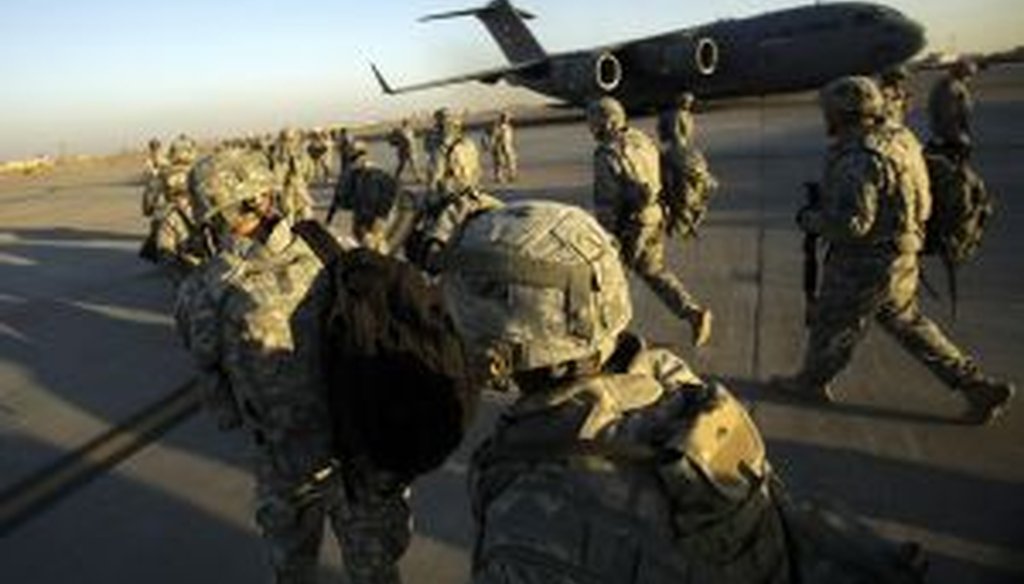Stand up for the facts!
Our only agenda is to publish the truth so you can be an informed participant in democracy.
We need your help.
I would like to contribute

Troops walk toward a C-17 aircraft at Sather Air Base in Iraq. (2010 AP Photo)
Editor's note: This story is part of a series highlighting special issues in light of the presidential election. This installment looks at foreign policy. Previous installments have looked at Medicare, the state of the economy, immigration, Iraq and Afghanistan, and tax policy.
When Mitt Romney and Barack Obama have discussed foreign policy, there’s been lots of accusations and finger-pointing.
Romney accuses Obama of apologizing for America, for being weak against Iran, Russia and China, and not supportive of Israel.
Obama, meanwhile, accuses Romney of incompetence and ignorance and of stoking aggression toward Iran. Obama charges that Romney’s approach to foreign policy would "take us back to an era of blustering and blundering that cost America so dearly."
Campaign ads have had an altogether different preoccupation: the economic threat from China. Dueling ads have claimed each candidate just isn’t tough enough at reining in China’s economic clout for the sake of American workers.
PolitiFact has been fact-checking the candidates on claims ranging from trade with China to sanctions against Iran. Some of their attacks have been accurate, while others are off the mark — sometimes widely so.
You’ll hear many of these same lines on Monday night, when the candidates for president will debate foreign policy. Each has been laying out a case against the other for many months.
Here, we’ll review the candidates’ factual claims on foreign policy and how they’ve scored for accuracy on our Truth-O-Meter.
Fact-checking the Romney campaign
One of Romney’s most repeated attack lines is that Obama began his presidency "with an apology tour."
In his 2010 book, No Apology: The Case for American Greatness, Romney wrote that Obama was "signaling to foreign countries and foreign leaders that their dislike for America is something he understands and that is, at least in part, understandable. There are anti-American fires burning all across the globe; President Obama’s words are like kindling to them."
PolitiFact examined seven separate speeches Romney mentioned as apologies. We found that while Obama used diplomatic language to acknowledge that America hasn’t always been perfect, Obama also was quick to point out other countries’ shortcomings and misperceptions. He would conclude by suggesting the countries work together and move forward.
Lauren Bloom, a business consultant and author of the book The Art of the Apology, noted that Obama’s comments can’t be considered apologies because he didn’t use the words "sorry" or "regret." His on-the-one-hand, on-the-other-hand comments are more in line with traditional diplomatic language, not formal apologies, she said.
"Gov. Romney is trying to appeal to the inner John Wayne of his readers, and that has a certain emotional appeal," Bloom said. "For the rest of us, a level assessment of less-than-perfect human behavior is perfectly reasonable." PolitiFact rated Romney’s oft-repeated charge as Pants on Fire.
Romney was on firmer ground when he used less heated rhetoric to critique Obama. Speaking at the Republican National Convention, Romney criticized Obama for failing to slow Iran’s push for nuclear weapons. Romney said that in Obama’s first TV interview as president, Obama said we should talk to Iran. "We’re still talking, and Iran’s centrifuges are still spinning," Romney said.
Romney is correct that Obama’s first TV interview from the White House was with Al Arabiya, a Middle East television network considered a moderate alternative to Al Jazeera. Obama criticized Iran for threatening Israel and pursuing nuclear weapons, but he also said that it was "important for us to be willing to talk to Iran, to express very clearly where our differences are, but where there are potential avenues for progress. … As I said during my inauguration speech, if countries like Iran are willing to unclench their fist, they will find an extended hand from us." PolitiFact rated Romney’s statement True.
The Romney team has also criticized the Obama administration for watering down economic sanctions against Iran, delaying them and trying to stop Congress "from putting the tough sanctions in place," according to Paul Ryan, Romney’s running mate.
There’s an element of truth there, but it ignores critical facts about the Obama administration and sanctions against Iran.
The administration pushed for flexibility from Congress as it organized an international coalition to counter Iran. That included compromises with Russia and China to earn backing from the U.N. Security Council. The ultimate aim was to increase pressure on Iran, said Michael Levi of the Council on Foreign Relations, an independent, nonpartisan think tank. "It’s really hard to argue that this administration hasn’t brought strong pressure to bear on Iran," he said. PolitiFact rated Ryan’s statement Mostly False.
On Israel, Ryan misstated the facts about a recent dust-up when Obama failed to meet with Israeli Prime Minister Benjamin Netanyahu in New York during meetings at the United Nations. Obama was in New York City "the same day Bibi Netanyahu is and he, instead of meeting with him, goes on a daily talk show," Ryan said during the vice presidential debate.
Actually, the two leaders were not there on the same day: Obama was there Monday and Tuesday, and Netanyahu was there later in the week, on Thursday and Friday. Obama taped an interview with The View on Monday. PolitiFact rated the statement False.
Fact-checking the Obama campaign
Obama has responded to the attacks while putting together a counterargument against Romney. "I’ve executed on my foreign policy, and it’s one that the American people largely agree with," Obama told 60 Minutes last month. "If Governor Romney is suggesting that we should start another war, he should say so."
Obama’s vice president, Joe Biden, blasted Romney for saying the end of the Iraq war was "a tragic mistake" and that America should have left 30,000 troops there. But Biden’s comments take things out of context. Romney was criticizing the pace of the withdrawal, saying too many troops were removed too soon, not that ending the war itself was a mistake. PolitiFact rated Biden’s charge Half True.
Ryan defended Romney’s positions by noting that the Republican team agrees that the war in Afghanistan must wind down as well, saying in an interview that he and Romney have "always said that we agree with the 2014 deadline" for leaving Afghanistan. Romney has expressed support for that date, but he’s also said troop withdrawal should be conditional on the situation on the ground. PolitiFact rated Ryan’s statement Mostly True.
The Obama campaign has touted one of the president’s signature accomplishments, ordering the killing of Osama bin Laden. In a web ad, former President Bill Clinton praised Obama’s actions, then the ad contrasted Obama’s actions with Romney’s comments on the terrorist. In 2007, the ad claimed, Romney said, "It’s not worth moving heaven and earth and spending billions of dollars just trying to catch one person."
But the ad leaves out half the story: Romney said he wanted to pursue all of al-Qaida, not just its leaders. The 2007 report noted specifically that Romney advocated for a broad strategy to defeat "the Islamic jihad movement." PolitiFact rated the Obama campaign’s claims about Romney’s comments as Half True.
Finally, the Democratic National Committee has defended Obama against charges that he hasn’t been sufficiently supportive of Israel. "Under President Obama, U.S. security funding for Israel is at an all-time high," said a Web ad from the Democrats. Actually, the ad oversells the credit Obama can take for security funding, which is near all-time highs. The amount was outlined by a memorandum signed in 2007 under President George W. Bush. PolitiFact rated the claim Half True.
All those ads about China
While the candidates have sparred on governing philosophies, the Middle East and international terrorism, their campaign ads have repeatedly looked toward China. On this topic, the campaign’s factual claims tend to reflect anxieties of American workers about the economy.
Priorities USA Action, a pro-Obama super PAC, charged in an ad that "thousands (in China) owe their jobs to Mitt Romney’s companies." As evidence, the group noted that Romney’s private equity group, Bain Capital, invested in Chinese companies. But the group didn’t try to document the specific number of employees. We rated the claim Half True.
Similarly, an Obama ad claimed Romney invested in a firm that made goods in China that "could have been made here in America." The United States had the technology and the workers to do the work, but trends in global trade made it unlikely. And that was the case long before Romney and Bain invested in the company. PolitiFact rated the claim Mostly False.
Meanwhile, a Romney ad accused Obama of not fighting China for violating trade rules. "Seven times Obama could have stopped China’s cheating. Seven times, he refused," the ad said.
The Obama administration did pass up opportunities to label China a currency manipulator, but that designation in the past hasn’t stopped the kind of "cheating" the ad mentioned. Meanwhile, the Obama administration has filed seven trade cases with the World Trade Organization — with more coming — and engaged in diplomatic talks. PolitiFact rated the ad’s claim Half True.
Another Obama ad says that Chinese tire imports threatened 1,000 American jobs, so Obama "stood up to China and protected American workers. Mitt Romney attacked Obama’s decision." Obama did impose trade sanctions against China on tires, and Romney criticized him for putting up trade barriers. PolitiFact rated the ad’s claim Mostly True.
Finally, Romney and other conservative outside spending groups have said in ads over and over again that money from the economic stimulus of 2009 went to pay for "windmills from China."
In reality, many American firms connected to the wind industry expanded during the years of the stimulus. Only a small fraction of the money spent on wind energy went to China, for example, for component parts to build wind turbines in the United States. PolitiFact rated this statement Mostly False.
Our Sources
See individual fact-checks for complete sources.

















































